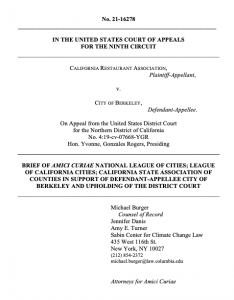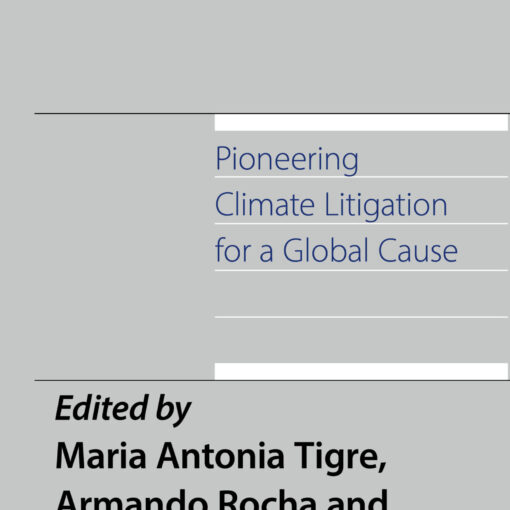By Amy Turner, Michael Burger & Jennifer Danis
Today, the Sabin Center filed an amicus brief on behalf of the National League of Cities, the League of California Cities, and the California State Association of Counties in California Restaurant Association v. City of Berkeley, a case before the U.S. Court of Appeals for the Ninth Circuit. The case concerns whether the U.S. Energy Policy and Conservation Act (EPCA) preempts a local ordinance in Berkeley, California that prohibits most natural gas hook-ups to newly-constructed buildings.
As described previously on this blog, in 2019, Berkeley enacted its so-called “natural gas ban,” setting off a wave of building electrification requirements across the state and, to some extent, the country. The California Restaurant Association, an industry group, challenged Berkeley’s ordinance, arguing that it was preempted by both state and federal law. In July 2021, the U.S. District Court for the District of Northern California upheld Berkeley’s ordinance against the CRA’s challenge, holding that EPCA does preempt the Berkeley gas prohibition simply by virtue of having “some downstream impact on commercial appliances.” The CRA appealed to the Ninth Circuit on the federal preemption claims only.
Our amicus brief argues that the Berkeley ordinance is a straightforward exercise of the city’s police power, which authorizes it to protect public health, safety, and general welfare. The police power is reserved to the states under the Tenth Amendment of the U.S. Constitution, and most states, including California, delegate some or all aspects of it to local governments within their borders. In enacting its natural gas restrictions, Berkeley was acting to protect its residents from actual and potential dangers related to indoor and outdoor air pollution, seismic risk and risk of explosion, and the impacts of climate change. Disallowing Berkeley’s ordinance would put at risk countless ways in which local governments protect their residents’ welfare.
The brief further argues that EPCA does not preempt Berkeley’s natural gas restrictions, and that the Restaurant Association’s reading of EPCA preemption under Section 6297(c) is overbroad. EPCA sets energy conservation standards for appliances, and preempts state and local energy conservation standards more stringent than the federal baseline. Berkeley’s ordinance pertains to the distribution of natural gas within the community, and the provision of gas to buildings, areas to which EPCA’s preemptive scope does not extend. Moreover, the CRA’s very broad reading of EPCA preemption has no limiting principle, and would lead to the preemption of myriad state and local laws that in some way relate to appliances, but that are not, and never have been, intended to be preempted by EPCA. Basic building requirements, safety regulations, and land use and zoning ordinances could potentially come under the scope of EPCA preemption if CRA’s reading were to prevail.
Cities around the country are central to combatting climate change, setting ambitious policies to reduce greenhouse gas emissions, switch to renewable energy sources, and decarbonize their entire communities. A decades-old federal law aimed at setting a uniform national standard for appliance manufacturers was never meant to preempt or prevent this kind of local action. Local governments will continue to be central to climate mitigation efforts, and the CRA’s challenge to Berkeley’s ordinance needlessly puts such local action in the preemption crosshairs. We therefore urged the Ninth Circuit to uphold the District Court’s ruling.
Read the brief here.
Amy Turner is the Director of the Cities Climate Law Initiative at the Sabin Center for Climate Change Law at Columbia Law School.




